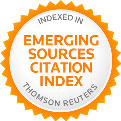Relaciones entre el consumo de tabaco y la práctica de actividad físico-deportiva en una muestra de la población de Madrid. (The relationship between smoking and leisure time physical activity in a sample of the population of Madrid).
Resumen
El principal objetivo del presente estudio fue aportar más evidencias sobre la relación entre el consumo de tabaco y la práctica de actividad física, así como sobre el efecto modulador que podrían ejercer las variables sexo y edad en la misma. Se efectuó un estudio transversal con una muestra de 625 personas. El muestreo fue polietápico, utilizándose un cuestionario ad hoc. Los resultados obtenidos mostraron que la práctica de actividad física y el consumo de tabaco eran conductas relacionadas [2(1)=7,373; p=,007; φ=,11]. Esa relación se explicaba por una incidencia del sedentarismo superior a la esperada (p menor que ,01) entre fumadores (51,9%). Además, dicha asociación difería según sexo [2(1)=12,172; p=,000; φ=,20] y se daba sólo en determinados grupos de edad: 15-19 [2(1)=5,012; p=,025; φ=,27] y 20-29 años [2(1)=7,580; p=,006; φ=,20]. Por tanto, de los resultados de este estudio se desprende que el tabaquismo y la práctica de actividad física son conductas que parecen estar inversamente relacionadas. No obstante, esta asociación se da en los varones, pero no en las mujeres y, en función de la edad, solamente entre jóvenes y adolescentes.
Palabras clave: consumo de tabaco; actividad física; ejercicio; deporte.
Abstract
The aim of this study was to provide more evidence about the relationship between smoking and leisure time physical activity. We also clarified the effect of sex and age on this relationship. A descriptive study with cross sectional design was used and 625 people were selected. Sampling was multistage and an ad hoc questionnaire was used. A significant relationship between leisure time physical activity and smoking [2(1)=7.373; p=.007; φ=.11] was found. A sedentary life was prevalent among smokers (51.9%) but not among non smokers (40.5%). This association was different by sex [2(1)=12.172; p=.000; φ=.20] and exist only in some age groups: 15-19 [2(1)=5.012; p=.025; φ=.27] and 20-29 [2(1)=7.580; p=.006; φ=.20]. Tobacco consumption and leisure time physical activity seem to be inversely related among men and amongst the young and adolescent of both sexes.
Key words: cigarette smoking; physical activity; exercise; sports.
doi:10.5232/ricyde2010.02004
Texto completo: PDF
---------------------------------------------------------------------
Referencias/references
Audrain-McGovern, J.; Rodríguez, D., & Moss, H. B. (2003). Smoking progression and physical activity. Cancer Epidemiol Biomarkers Prev, 12, 1121-1129.
PMid:14652270
Bassuk, S. S., & Manson, J. E. (2005). Epidemiological evidence for the role of physical activity in reducing risk of type 2 diabetes and cardiovascular disease. J Appl Physiol, 99, 1193-1204.
doi:10.1152/japplphysiol.00160.2005
PMid:16103522
Boreham, C.; Twisk, J.; Neville, C.; Savage, M.; Murray, L., & Gallagher, A. (2002). Associations between physical fitness and activity patterns during adolescence and cardiovascular risk factors in young adulthood: the Northern Ireland Young Hearts Project. Int J Sports Med, 23(s1), 22-26.
doi:10.1055/s-2002-28457
PMid:12012258
Boyle, R. G.; O’Connor, P.; Pronk, N., & Tan, A. (2000). Health behaviors of smokers, ex-smokers, and never smokers in an HMO. Prev Med, 31, 177-182.
doi:10.1006/pmed.2000.0699
PMid:10938219
Burke, V.; Milligan, R. A. K.; Beilin, L. J.; Dunbar, D.; Spencer, M.; Balde, E., & Gracey, M. P. (1997). Clustering of health-related behaviors among 18-year-old Australians. Prev Med, 26(5 Pt 1), 724-733.
doi:10.1006/pmed.1997.0198
PMid:9327483
Centers for Disease Control and Prevention (2001). Physical activity trends: 1990-1998. Morb Mortal Wkly Rep, 50, 166-169.
PMid:11393487
Chiolero, A.; Wietlisbach, V.; Ruffieux, C.; Paccaud, F., & Cornuz, J. (2006). Clustering of risk behaviors with cigarette consumption: a population-based survey. Prev Med, 42, 348-353.
doi:10.1016/j.ypmed.2006.01.011
PMid:16504277
Erikssen, G.; Liestol, K.; Bjornmholt, J.; Thaulow, E.; Sandvik, L., & Erikssen, J. (1998). Changes in physical fitness and changes in mortality. Lancet, 352:759-762.
doi:10.1016/S0140-6736(98)02268-5
Griep, R. H.; Chór, D., y Camacho, L. A. (1998). Tabagismo entre trabalhadores de empresa bancária. Rev Saúde Pública, 32, 533-540.
doi:10.1590/S0034-89101998000600006
González, J.; Banegas, J. R.; Rodríguez, F.; Díez-Gañán, L., y Villar, F. (2005). La mortalidad atribuible al tabaquismo comienza a disminuir en España. Medicina Clínica, 124, 769-771.
doi:10.1157/13075847
Kaczynski, A.; Manske, S.; Mannell, R., & Grewal, K. (2008). Smoking and physical activity: a systematic review. Am J Health Behav, 32, 93-110.
PMid:18021037
Klesges, R. C.; Stein, R. J.; Hultquist, C. M., & Eck, L. H. (1992). Relationships among smoking status, body composition, energy intake, and physical activity in adult males: A longitudinal analysis. J Subst Abuse, 4, 47-56.
doi:10.1016/0899-3289(92)90027-U
Murray, C. J., & López, A. D. (1997). Alternative projections of mortality and disability by cause 1990-2020: global burden of disease study. Lancet, 349, 1498-1504.
doi:10.1016/S0140-6736(96)07492-2
Pitsavos, C.; Panagiotakos, D. B.; Lentzas, Y., & Stefanadis, C. (2005). Epidemiology of leisure-time physical activity in socio-demographic, lifestyle and psychological characteristics of men and women in Greece: the ATTICA study. BMC Public Health, 5, 37.
doi:10.1186/1471-2458-5-37
PMid:15836794 PMCid:1087851
Poortinga, W. (2007). Associations of physical activity with smoking and alcohol consumption: A sport or occupation effect? Prev Med, 45, 66-70.
doi:10.1016/j.ypmed.2007.04.013
PMid:17561247
Poortinga, W. (2006). The prevalence and clustering of four major lifestyle risk factors in an English adult population. Prev Med, 44, 124–128.
doi:10.1016/j.ypmed.2006.10.006
PMid:17157369
Sherwood, N. E.; Hennrikus, D. J.; Jeffery, R. W.; Lando, H. A., & Murray, D. M. (2000). Smokers with multiple behavioral risk factors: How are they different? Prev Med, 31,299-307.
doi:10.1006/pmed.2000.0710
PMid:11006054
Stein, C. J., & Colditz, G. A. (2004). Modifiable risk factors for cancer. Br J Cancer, 90, 299-303.
doi:10.1038/sj.bjc.6601509
PMid:14735167 PMCid:2410150
Steptoe, A.; Wardle, J.; Fuller, R.; Holte, A.; Justo, J., & Sanderman, R. (1997). Leisure time physical exercise: Prevalence, attitudinal correlates, and behavioral correlates among young Europeans from 21 countries. Prev Med, 26, 845-854.
doi:10.1006/pmed.1997.0224
PMid:9388797
Strine, T. W.; Okoro, C. A.; Chapman, D. P.; Balluz, L. S.; Ford, E. S.; Ajani, U. A., & Mokdad, A. H. (2005). Health-related quality of life and health risk behaviors among smokers. Am J Prev Med, 28, 182-187.
doi:10.1016/j.amepre.2004.10.002
PMid:15710274
Verkooijen, K. T.; Nielsen, G. A., & Kremers, S. P. (2008). The association between leisure time physical activity and smoking in adolescence: An examination of potential mediating and moderating factors. Int J Behav Med, 15, 157-163.
doi:10.1080/10705500801929833
PMid:18569134
Ward, K. D.; Vander Weg, M. W.; Klesges, R. C.; Kovach, K. W.; Elrod, M. C.; DeBon, M.; Haddock, C. K.; Talcott, G. W., & Lando, H. A. (2003). Characteristics of highly physically active smokers in a population of young adult military recruits. Addict Behav, 28, 1405-1418.
doi:10.1016/S0306-4603(02)00267-8
---------------------------------------------------------------------
Palabras clave/key words
Texto completo/Full Text:
PDF------------------------ 0 -------------------------
RICYDE. Revista Internacional de Ciencias del Deporte
![]()

Publisher: Ramón Cantó Alcaraz
ISSN:1885-3137 - Periodicidad Trimestral / Quarterly

